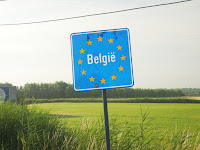This
blog continues the previous Part 7,
Sunday, June 24, 2018
I slowly
crossed the outskirts of Brussels and walked steadily towards the center of the metropolis. I've already mentioned that I had plenty of time so I've decided not to use
any public transportation but rather use my own feet. I've made this decision
to learn more about the country and the city, tried to figure out if I like it
and if a positive experience let me stay longer or leave to another country
within the European Union.
Walking thru
the Streets of Belgium: Me, My Luggage and My Camera...
I've met
a lot of non-Europeans who traveled several countries within the EU (European
Union). For me as a German I could go wherever I wanted with my
passport even for some countries I had to change my Euros into local
currencies (British Pounds, Swiss Francs etc.). So walking on the roads and
experience the environment in Belgium or rather Brussels helped me in my
decision to stay in this country for my whole holidays of 3 weeks!
 |
Everyday Open
Air Antique Market right in front of my Hotel
|
The language
barrier was not a real problem because even people could not
speak English they tried at least. I've asked one younger person why the
Belgians do not speak English he answered "because we do not have the
chance to use it". They learn English in school but very seldom speak
it...
Dutch is
the official and most spoken language (60%) of the Flemish Community and the
Flemish Region (merged to Flanders). The main Dutch dialects are Brabantian,
West Flemish, East Flemish and Limburgish.
French is
with 40% speakers the second most spoken language. It is the dominant language
in Wallonia as well as in the Brussels-Capital Region.
There are only around 0.4% people speaking German, I did not
even run into one during my whole trip.
What I appreciated during the trip is the road system and the manners of
the Belgian drivers. A zebra crossing or crosswalk is working very well. Even
before coming near the thick lines on the road, cars & trucks were already
breaking and patiently waiting while I was crossing the road. Living in chaotic
Taipei this is unthinkable. Many people here in Taiwan 'blame' the disobeying
of rules on the many citizens but I believe traffic is about respect for
others, a lack of education & responsibility and a general
'disobeying' or selfish way of life. While in the Far East the 'stronger' wins
in Belgium it looks that the weaker are protect...I enjoyed crossing the roads
in Belgium very much which, for me, translates into 'maturity of its citizens'.
 |
Typical Fruit
and Vegetable Shop also selling Tobacco and Cigarettes in Brussels
|
What do I mean by that?
'Maturity'
according to the Cambridge Dictionary is:
- the quality
of behaving mentally and emotionally like an adult
- a very advanced
or developed form or state
Do you
understand that a car can be a weapon? Do you understand that you have
responsibilities etc.
The other thing I really appreciated is the willingness to
maintain the public safety. In Brussels I've encountered heavily armed soldiers
and policeman walking the streets and the train stations. I never felt
threatened or insecure, even drunkards and beggars tried to keep it quiet
and to themselves. Some people complained that Belgium police first ‘act’ then
‘ask’ but for me this sounds very reasonable in times when even democratic
elected presidents rather divide than unite, sew the ignorant seed of hate
rather than to understand and try to learn.
In
Belgium there is a constant maintenance of roads and public buildings like
train stations which might be cleaned, repaired and even renewed. This shows
that the government is willing to improve and not let the country fall apart.
During my holidays I could go wherever I wanted in Europe. But my experiences during these first six
hours on Belgian roads from the airport to my hotel helped me decide to stay
the next three weeks in this 'small but beautiful country’, as a sales lady
described her own Belgium in a small drugstore in the Belgian city of Tervuren
on my way to Namur.
 |
Water Fountain near Tervuren on my way to Namur
|
Disclaimer: I traveled Belgium by myself, I am not sponsored by anyone. Interested subscribers and/or followers in traveling an in this small but beautiful country are more than welcome! If not convenient to subscribe on Blogger.com, I've started my own homepage @ https://gerhardwanninger.wixsite.com/travel




